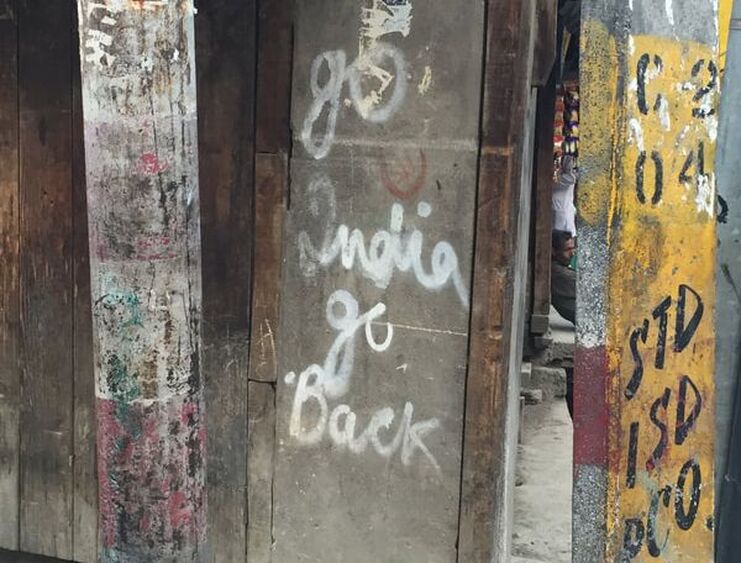|
|
|
'Kashmir is a Palestine no one talks about'.
I recorded this remark by a friend sympathetic to both struggles almost a decade ago. She knew enough to realise early on as to what was prevalent and what would be unfolding for the Indian occupied Kashmir in the future. As I discuss in my Identities article, ‘"Their wounds are our wounds": a case for affective solidarity between Palestine and Kashmir’, while the political histories of both regions are different, broadly speaking, they ‘seem’ very similar and separated only by continents. Strong overlaps exist in having been midwifed by the waning British Empire in 1947, UN intervention and internationalisation, and in their resistance movements, that are undermined by what the current global politics lumps erroneously as 'Islamic terrorism'. The 'suffering' of people due to the heavy military presence is one of the most visually gripping hallmarks of both struggles. While these overlaps exist, settler colonialism as a fatal project of the Indian occupation of Kashmir has not been very easy to picture, especially for the international community.
It has taken scholars of Critical Kashmir Studies, an emerging subdiscipline in South Asian Studies, several decades of scholarship to manifest how India, first and foremost, is an occupying power in Jammu and Kashmir, and how since 1947 it enforced policies that eroded the region’s territorial autonomy and in time paved the way for settler colonialism. The policies put into place by India, which the UN admonished in the early 1950s, have enabled all the subsequent Indian governments to curb Kashmiri dissent and create a scaffolding for 'electoral politics'. Thus, India got away with playing the politics of democracy (Zia 2019) in a region that is both an internationally recognised dispute and an occupation. Subsequently, a stream of client governments and rigged elections paved the way for legal rulings directly handed down by India, which pared down Kashmir’s autonomy. This process of legal incorporation of Kashmir that was made operational through courts constitutes what Duschinski and Ghosh (2017: 34) call occupational constitutionalism.
On 5 August 2019, the entire world witnessed the culmination of this process by the current Indian government, run by the right-wing Hindu nationalist outfit the Bharatiya Janata Party (BJP). In a broader neocolonial context, the erasure of Kashmir’s autonomy is also the fruition of the Hindu indigeneity ideology based on which Muslims in the Indian subcontinent are cast as invaders and foreigners, and Kashmiri Muslims are doubly marked as the Other: first as Muslims and second, as Kashmiris who are committed to an irrepressible struggle for a UN-mandated plebiscite and democratic sovereignty. The BJP unilaterally and militarily de-operationalised Kashmir’s autonomous status and territorial sovereignty. For the people in Kashmir, a Muslim majority state, their longstanding fear of settler colonialism and its attendant evils of dispossession and cultural imperialism were openly put into motion. Nearly all the 8 million Kashmiris were imprisoned in their homes under a curfew and communication lockdown. There was complete communication blackout, which meant no phones, no Internet and not even basic cable TV. While curfews, communication bans and lockdowns are not new to Kashmiris, the intensity and the duration of the siege became a shock. India broke its own record in the longest internet shutdown – over eight months. Even today as the world faces a pandemic, Kashmiris only have partial access to mobile phones and the internet, which is slow and text based. On top of the COVID-19 quarantine, relentless war, counterinsurgency tactics, and facing the dearth of healthcare and information, Kashmiris had to face yet another assault from the Indian rule through the unilateral amendment to the domicile act. After the forceful abolition of Kashmir’s territorial sovereignty, the amendment in the domicile act manifests the active beginning of Indian settler colonialism, which according to some Kashmiri scholars, constitutes a form of demographic terrorism. Furthermore, Indian authorities have designated categories of people from India who can claim domicile in Kashmir and acquire the right to franchise, property and employment. If the issuing authority does not issue the domicile paperwork within 15 days, they would be fined to the tune of 50,000 India Rupees. This is the first time that a bureaucrat will be individually penalised for not providing paperwork within a time stipulated by the government, which is relatively fast. If anything, it shows the urgency which the government of India is imposing to ensure faster processing of settlers. This is a settler colonial plan on steroids being imposed when Kashmiris are doubly quarantined and unable to lodge protest of any kind. These policies only underline the sheer intensity with which the policy of settler colonialism, dispossession of indigenous people and rampant exploitation of resources that India is putting in place in Kashmir. The echo of 'going the Palestine way' is no more a fear but a fearful reality. References: Duschinski, H. & Ghosh, S. 2017. Constituting the occupation: preventive detention and permanent emergency in Kashmir. Journal of Legal Pluralism and Unofficial Law 49 (3): 314–337. Zia, A. 2019. Resisting disappearance: women’s activism and military occupation in Kashmir. Seattle. Washington University Press.
Blog post by Ather Zia, University of Northern Colorado, USA
Read the full article: Zia, Ather. “Their wounds are our wounds”: a case for affective solidarity between Palestine and Kashmir. Identities: Global Studies in Culture and Power. DOI: 10.1080/1070289X.2020.1750199
0 Comments
Your comment will be posted after it is approved.
Leave a Reply. |
|
Explore Identities at tandfonline.com/GIDE |
|
The views and opinions expressed on The Identities Blog are solely those of the original blog post authors, and not of the journal, Taylor & Francis Group or the University of Glasgow.

